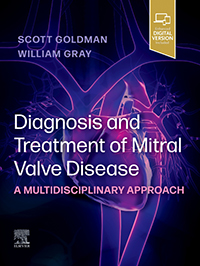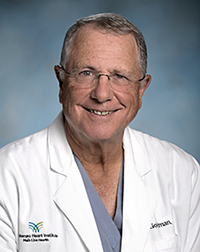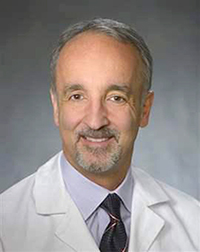Main Line Health physicians write the book on mitral valve disease

Scott M. Goldman, MD, and William A. Gray, MD, compile the first authoritative reference for cardiac specialists, with key insights and contributions from Lankenau Heart Institute colleagues and leading experts in mitral valve disease.

Wynnewood, PA — Physician experts from Lankenau Heart Institute, part of Main Line Health, have literally written the book on the most common heart valve condition in the United States: mitral valve disease.
Scott M. Goldman, MD, and William A. Gray, MD, two of the country’s leading surgical and interventional experts in mitral valve disease, served as editors of Diagnosis and Treatment of Mitral Valve Disease: A Multidisciplinary Approach. They recruited some of the most influential people advancing the treatment of mitral valve disease from across the United States and Canada to contribute to the volume. The electronic version was released in July, with the hardback due out on October 1. Seventeen colleagues from Lankenau Heart Institute joined experts from the Cleveland Clinic, Penn Medicine, Columbia University Irving Medical Center and other leading institutions in helping to author chapters.

“With all the transformational advances in the treatment of mitral valve disease, Dr. Gray and I felt the time was right to help guide physicians with the most up-to-date information,” said Dr. Goldman, Director, Structural Heart Program, Lankenau Heart Institute, and clinical professor with the Lankenau Institute for Medical Research (LIMR). Dr. Goldman has almost 40 years’ experience with mitral valve repair, is a pioneer in minimally invasive mitral valve surgery and is principal investigator for multiple valve trials.
“We relied on decades of collective experience in the field to assemble a volume of topics that we’ve identified to be the most valuable in managing these patients and delivering the best outcomes,” Dr. Goldman added.
The most common type of mitral valve disease, mitral regurgitation, involves failure of the valve to close completely, allowing blood to leak backward. Severe leakage will result in not enough blood pumping through your heart or the rest of the body, potentially leaving individuals fatigued and short of breath. Heart rhythm problems or heart failure can result if not properly treated.

“In our experience, successful treatment requires a multidisciplinary approach and a super-sub-specialization focus,” said Dr. Gray, System Chief, Division of Cardiovascular Diseases, Main Line Health; co-director, Lankenau Heart Institute; and a LIMR professor. “We sought contributions from an array of specialists, including general and heart failure cardiologists, cardiac surgeons, structural interventional cardiologists, advanced imaging cardiologists, midlevel providers and researchers. We think their perspectives and knowledge will help new mitral valve programs and teams get off to a successful start and allow established programs to advance and thrive.”
The book provides the latest evidence on the development of disease, imaging techniques, and medical, surgical, and transcatheter therapy options for patients with mitral valve disease. It also discusses how to assemble a multidisciplinary team and establish program infrastructure.
Lankenau Heart Institute has a proven track record of offering innovative and successful treatment options for mitral valve disease. The Heart Valve team recently performed its 300th mitral valve repair using the MitraClip™ procedure—a minimally invasive treatment option for those who are too high risk for traditional open heart surgery and select heart patients who remain symptomatic despite guideline-directed medical therapy. Dr. Gray has been involved with MitraClip since its inception almost 20 years ago, including going through Food and Drug Administration studies leading to its approval.
Dr. Gray is principal investigator for more than 50 clinical trials of coronary, endovascular and structural heart interventions.
The book’s other contributing authors from Lankenau Heart Institute are Sandra Abramson, MD, FACC, FASE; Steven M. Domsky, MD; Douglas B. Esberg, MD; Eric M. Gnall, DO; Katie M. Hawthorne, MD, FACC; Benjamin I. Horn, DO; Manju Bengaluru Jayanna, MD, MS; Gwyneth McNeill, DO; Sehrish Memon, MD; Yinn Shaung Ooi, MD; Michel Pompeu Sá, MD, PhD; Basel Ramlawi, MD, FACS, FACC; K. Marco Rodriguez; Roberto Rodriguez, MD, MS; Zach Rozenbaum, MD; Serge Sicouri, MD; and Chidinma Tiko-Okoye, MD, MPH.
About Lankenau Heart Institute
The Lankenau Heart Institute is Main Line Health's premier comprehensive cardiovascular medicine and surgery program. Lankenau Heart Institute brings together the clinical expertise of all four Main Line Health acute care hospitals and both the employed and community cardiology practices to ensure that patients receive a level of quality, service and experience that is unparalleled in the region. Through the systemwide coordination of services, Lankenau Heart Institute delivers preventive, diagnostic, therapeutic and rehabilitative cardiovascular services at each of our locations including Lankenau Medical Center, Bryn Mawr Hospital, Paoli Hospital and Riddle Hospital.
Lankenau Heart Institute continues to be an innovator in the use of beating-heart techniques and robotic-assisted procedures for coronary artery revascularization, minimally invasive and transcatheter approaches for valve repair and replacement, complex aortic surgery and heart rhythm disorders. With our growing experience and focus on minimally invasive techniques, Lankenau Heart Institute has expanded participation in clinical trials year after year. Our physicians are frequently invited to participate in clinical/medical device trials, many of which are designed to facilitate the use of minimally invasive approaches and procedures.
With a collaborative team of expert consultative cardiologists, interventional cardiologists, electrophysiologists, cardiovascular surgeons and specially trained advance practice nurses and technologists, Lankenau Heart Institute is dedicated to managing and treating patients with simple to complex cardiovascular disease, including heart failure, aortic disease, coronary and peripheral vascular disease, lipid and genetic abnormalities, heart rhythm disorders and valve disease. Our team of cardiologists and cardiac and vascular specialists provide patients and their families with expert cardiovascular care, close to home.
About Main Line Health
Founded in 1985, Main Line Health is a not-for-profit health system serving Philadelphia and its suburbs. Main Line Health's commitment — to deliver safe, high-quality, equitable and affordable care for treating and curing disease, playing an important role in prevention and disease management, as well as training physicians and other health care providers — reflects our intent to be the region's premier choice for clinical care, research, and education. A team of more than 13,000 employees and over 3,500 employed and independent physicians and advanced practice providers care for patients throughout Main Line Health.
At Main Line Health's core are four of the region's most respected acute care hospitals — Lankenau Medical Center, Bryn Mawr Hospital, Paoli Hospital and Riddle Hospital — as well as one of the nation's premier facilities for rehabilitative medicine, Bryn Mawr Rehab Hospital.
Main Line Health also includes Mirmont Treatment Center for drug and alcohol recovery; Main Line Health HomeCare & Hospice, which includes skilled home health care, hospice and home infusion services; Main Line Health Centers, primary and specialty care, lab and radiology, and other outpatient services located in Broomall, Collegeville, Concordville, Exton, King of Prussia and Newtown Square; Lankenau Institute for Medical Research, a biomedical research organization; and Main Line HealthCare, one of the region's largest multispecialty physician networks.
Main Line Health is the recipient of numerous awards for quality care and service, including the prestigious American Hospital Association Quest for Quality Prize, highest tier ratings from the Centers for Medicare & Medicaid Services (CMS) for Overall Hospital Quality and systemwide recognition in the 2023-2024 U.S. News & World Report Best Hospitals rankings. Main Line Health is committed to creating an environment of diversity, respect, equity and inclusion, has proudly received awards in this area and has embraced the American Hospital Association's #123forEquity Pledge to Act to eliminate disparities in care. We are dedicated to advancing patient-centered care, education and research to help patients stay healthy and live their best lives.
For more information, visit mainlinehealth.org and connect with us on social media:
LinkedIn: www.linkedin.com/company/main-line-health
Facebook: www.facebook.com/mainlinehealth
X (formerly known as Twitter): www.twitter.com/mainlinehealth
Instagram: www.instagram.com/mainlinehealth